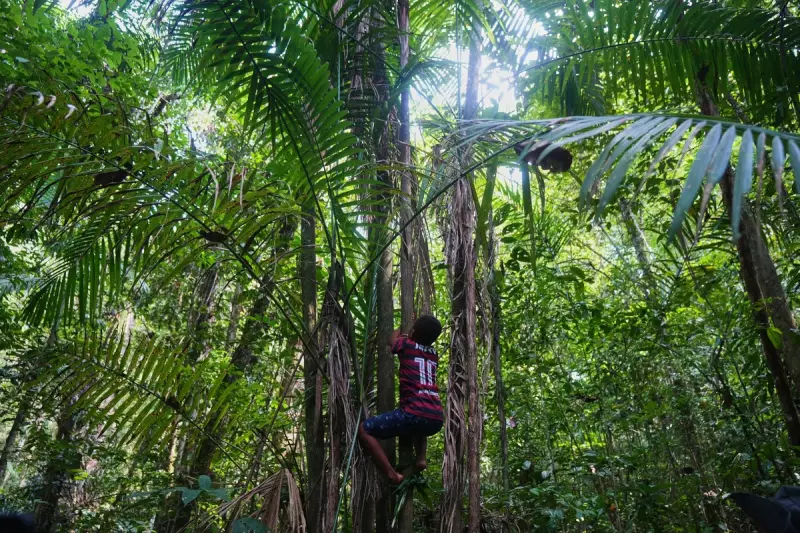
Amazon Communities Uphold Traditions Amid Land Rights Battle
As world leaders gather in the Brazilian city of Belem for the UN climate conference COP30, a different kind of struggle is unfolding just forty minutes away by boat. In the community of Itacoa-Miri, home to approximately 500 residents, Zaqueu Belém Araújo demonstrates a generations-old technique for harvesting acai berries. Using a skilfully crafted ring from a palm leaf, he scales the tree trunk barefoot, collecting the coveted fruit without harming the plant.
This minimally invasive method is emblematic of the philosophy held by the quilombos – communities descended from runaway slaves. For them, the health of the forest is inextricably linked to their own survival. Erica Monteiro, a coordinator at the Malungu association and a prominent Afro-descendant leader, explains, "We understand that keeping the forest alive also keeps us alive."
The High Stakes of Land Titling
Throughout the climate conference, which began early this month and is scheduled to end on Friday, both quilombo residents and Indigenous peoples have been pressuring the government for more land titles. They see official recognition as fundamental to defending their rights and protecting their ecosystems.
Monteiro describes acai as central to life in the quilombos, serving as a vital food source. By preserving traditional harvesting and production methods, they simultaneously safeguard the lush surrounding forest. "Our life is this struggle to ensure that the forest stays alive. Sometimes the price we pay is very high," she states. Her fight against illegal logging and land invasions for cattle ranching and soy farming has led to threatening phone calls, extortion attempts, and intimidation.
This is why her community fought for years to achieve a rare feat: obtaining a document recognising their land ownership. A recent study by the National Coordination of Rural Black Communities reveals a stark reality. While there are nearly 2,500 quilombos in the Brazilian Amazon, only 632 have been officially mapped by federal institutes.
"If you can’t prove that the land belongs to the community, agribusiness ends up doing what we call in Brazil 'grilling,' which is forging false documentation in their favour," Monteiro warns. Through Malungu, she now assists other communities in the lengthy and costly process of securing land titles, a battle her own community won over twenty years ago.
A Tale of Two Quilombos: Recognition and Ongoing Threats
The benefits of land titling are evident in Itacoa-Miri. With philanthropy funding from the Ford Foundation and the Climate and Land Use Alliance, the community now boasts a health centre, a school, electricity, and running water.
In stark contrast, the nearby quilombo of Menino Jesus presents a different picture. According to local resident Fabio Nogueira, they only received their land title in November last year, and it was for less than half of the 2,160 hectares (around 5,340 acres) they claim. Their newfound, partial security is now threatened by a new danger.
Approximately 500 metres from Nogueira's home, a company called Revita is attempting to establish a landfill. Nogueira, the vice president of the Menino Jesus territory association, fears it will contaminate the aquifers they depend on for fishing and daily life. "Our fear is that both the springs there and the water in our wells will be polluted by the leachate produced by the waste," he said. Revita did not respond to requests for comment.
The community, who say they were never consulted, feel powerless. "We are afraid that we will no longer be able to survive here because of the smell and the contamination that will come after," Nogueira admits. The Public Defender’s Office has filed a lawsuit on their behalf, but it has not yet been granted.
Scepticism Amid Global Climate Promises
As one of the major announcements of COP30, a fund has been established to pay for keeping trees standing. However, Erica Monteiro views this with scepticism. She argues that communities like hers, which are actively preserving the forest, should be compensated by Brazil and other countries.
"We are doing what the world should be doing, which is preserving the forest," Monteiro asserts. "And we are paying a very high price that many countries don't want to pay." Her doubt is rooted in experience; previous funds aimed at forest preservation have failed to reach her community. For the quilombos, the fight for full land recognition remains the most critical step in their ongoing battle to protect their homes and the Amazon itself.





